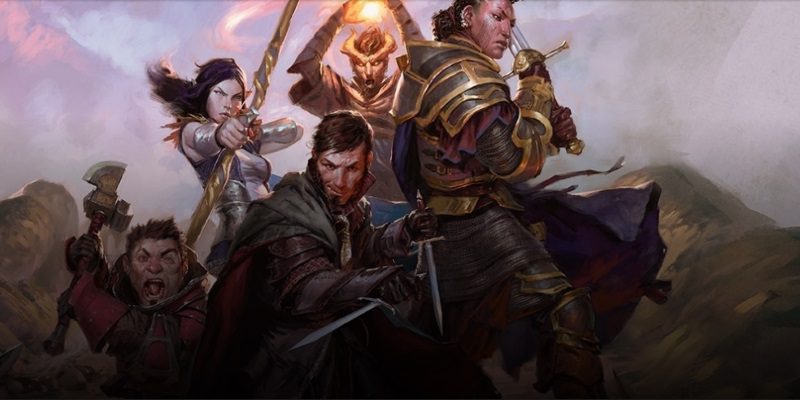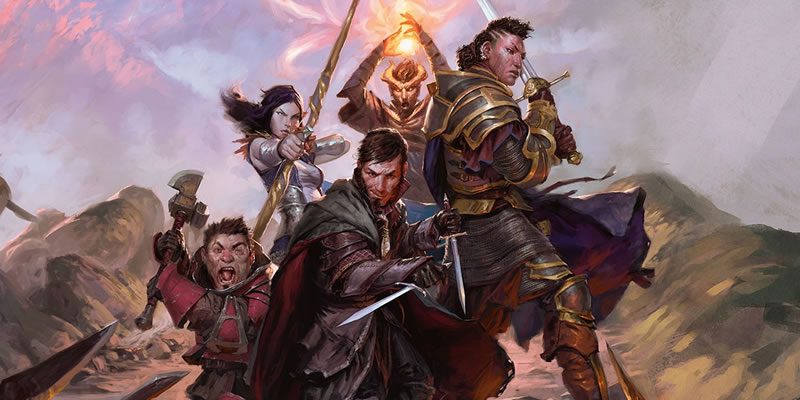UA: Feats for Skills Breakdown

A new collection of feats is always an interesting proposition in 5e, since good feat design is a demanding proposition in the current environment, and that’s what we get in this week’s Unearthed Arcana article. Specifically, it has feats that build on skills and turn that skill into a central character element. Eighteen feats are an unlooked-for boon, so let’s dive in.
These feats grant +1 ability score point in the ability relevant to that skill, and either proficiency or – if you already had proficiency – expertise (that is, double proficiency). So that I don’t have to say it for every skill, I think this dilutes the defining usefulness of the rogue and bard Expertise features, as well as the very small number of other class and subclass features that do the same thing.
This amounts to letting each character hyper-specialize in a few skills, if they wish. Prior to the introduction of these feats, skills exist within 5e’s sacred bounded-accuracy paradigm. For some skills, it really matters that PCs can gain a massive edge over comparable NPC scores – for example, Athletics makes a PC’s shoving and grappling dominant over anything that they’re allowed to shove or grapple (since size limits apply). Considering how many creatures rely on grappling in their combat tactics, PCs are picking up a 10-30% edge, if ability scores and proficiency bonuses are otherwise equal.
That assumes, in turn, that they don’t intend to introduce expertise-like mechanics for NPCs, and let’s pray that they don’t – NPCs departing from their own, slightly different bounded-accuracy paradigm continues the sunsetting of Monster Manual statblocks that we see in a very mild form in Volo’s Guide to Monsters. We usually talk about PCs being on content treadmills from power creep (i.e., feats and prestige classes from later products are intrinsically more powerful than feats and prestige classes from earlier ones), but a casual tour of 3.x and 4e Monster Manuals I-LXVIII shows that it happens on the other side of the screen too, as the DM has to play along in the arms race. Let’s not and say we didn’t.
This is rather alarmist rhetoric, I’ll grant, for a playtest document. Circling back, then, my central point is that diluting the uniqueness of Expertise and similar mechanics is a risky move. The Player’s Handbook 3 of 4e did a lot with these kinds of concepts as powers that one acquired through feats. Many of those applications suited 4e’s aesthetic far better than these feats match 5e’s aesthetic, though.
Acrobat
In addition to the functions of every feat in this document (mentioned above), Acrobat lets you try to do flips and shit to ignore difficult terrain. You spend a bonus action and make an Acrobatics check against DC 15. Why a fixed 15? Probably because it’s just high enough to make it difficult to push failure completely off the table (+5 from Dex and a doubled +5 proficiency bonus means you need to be 13th level), but low enough that you can probably use this feature, even if Dex is not your best score. Overall, this one is underwhelming but fine, since there are numerous other features to ignore some or all difficult terrain. Acrobatics is one of the better skills for which to pick up doubled proficiency.
Animal Handler
So, for a wide range of character levels, this feat is considerably better than the Beast Master Conclave’s core function, as long as you can use some combination of spells, skills, and roleplaying to get the beast’s disposition to friendly. On the downside, the beast doesn’t scale up as you gain levels, and doesn’t gain additional features; on the upside, your bonus action becomes its Multiattack action, and as long as you keep it happy and alive, this has no reason to end.
This is probably the most broken feature in the whole document. For what it’s worth, doubled proficiency in Animal Handling is mostly useless, since there aren’t a lot of other pre-defined functions for that skill. (Yes, DMs and adventures can add them on an ad-hoc or lasting basis. This is a solution for that table or adventure alone, and a through-line problem with .)
Arcanist
Of all the feats in this document that grant some kind of spellcasting, Arcanist is the one that doesn’t get my back up. I mean, it’s doing what it implies on the tin, so sure. Prestidigitation, or Housework for Dummies Geniuses, fits fine here, and detect magic once per long rest is about what I’d expect. Only the Int boost and skill bonus stop this from being a crummy special case of the Magic Initiate feat, but at least Arcana checks come up often. This feat is fine, maybe a little ho-hum.
Brawny
This feat’s extra feature is increasing your carrying capacity. Of course, because they didn’t want to overly penalize Small creatures, Small and Medium creatures have the same carrying capacity, which means Small creatures gain no benefit from this part of this feat. Good times. Doubled Athletics proficiency is great, of course; only Perception and Stealth are better. This feat is fine when it works properly, but disappointing for Small creatures.
Diplomat
It seems totally on-message for Persuasion to have a way to impose the charmed condition, right? Um. This has the problem of an envisioned use and an optimal use, and the two having little to do with one another. To use this feature, you talk to a creature for a minute while not fighting it, and you make a Persuasion check opposed by their Insight (I bet they don’t have double their proficiency bonus). If you succeed, the creature is charmed as long as it remains within 60 feet of you, and for 1 minute thereafter. It seems like Mearls and Crawford envisioned characters stalling and fast-talking in the 1 minute that leads up to combat, functionally working like crowd control.
This feature hugely breaks larger social scenes, though, such as royal audiences. If they don’t cut you off immediately, you have good odds of charming whoever you’re talking to, which means all later checks until you’re more than 60 feet away gain advantage. In combination with your already dominating total check bonus… yeah, this is the new iteration of the 3.x half-elf bard with Too Much Diplomacy.
In short, this one can really wreck the show. It’s one thing to be the party’s Face character, and quite another to run roughshod over every social encounter until the DM decides to stop using social encounter rules completely.
Empathic
The third feature here is about cold reading people for violence or profit. The problem is that it spends your action to make a contested Insight vs. your target’s Deception, and if you succeed you gain advantage on attack rolls or ability checks against that target until the end of your next turn. If that sounds a lot like getting to cast true strike, which no one ever does on purpose, then… yeah, you’ve basically got it, except that this has a failure chance, but also applies to more than one attack in that span. Its combat application, then, is underwhelming.
Then there’s the non-combat application, when action economy doesn’t matter. In a social scene, when you can spend your action to cold-read someone while also keeping up the conversation, the ability to gain advantage on all ability checks against a person (as long as you keep spending actions to cold-read) is… possibly really good, depending on how your DM handles skill checks in social encounters.
Declining to formalize a lot of rules applications has been one of the great strengths of 5e – it lets 5e be everything to everyone, whether you like mechanized social rules or not, whether you care about elaborate chase scenes or not, and so on. It also means that every adventure writer builds a one-off subsystem for whatever skill challenge they devise. It gets a lot more complicated when it comes to judging the potency of optional add-ons like feats, subclass features, and magic items. So… who the hell knows.
Historian
I like this feat’s third feature pretty well – it lets you share your proficiency by sharing advice, if you can cook up a good historical example. I mean, sure, you might be stacking proficiency bonuses into the middle of next week if they already have Expertise in that skill, but… well, that’s why Expertise should not get proliferated, isn’t it? Anyway, seems solid. I would require player to roleplay the advice rather than handwave it, unless I felt that would freak out a shy player.
Investigator
Investigation is one of those really tough skills that needs a lot clearer of a standard application, because so many things that it could do are already firmly staked out by Perception. The thrust of the Player’s Handbook text suggests that Investigation is for everything that follows “therefore,” which is a bad problem – I want to give the players clues and have them assemble their own “therefores.” This feat’s third feature improves the action economy of Searching, an action that might use either Perception or Investigation. I don’t think in-combat searching is all that common, except for interacting with invisibility and illusions, so this is probably a low-performing feat as written.
Medic
Oh, Medic. How you try to compete with the Healer feat, but so plainly cannot. Let’s face it, Medicine skill checks are perilously near to outright useless – everything that check reliably does, you could do by spending 5 silver pieces of supplies out of a healer’s kit. Doubled proficiency? Yeah cool ha ha no.
So it’s down to the third feature whether this is worth it or not. (Medic’s +1 Wis modifier is fine, but if that was enough to turn your head, you could have had two of them instead.) Healer, you’ll recall, restores 1d6 + 4 + target’s HD hit points, and the ability to receive this healing refreshes on a short rest. Imagining that you pick this feat up at 4th level, we’re talking about 1d6 + 8, or an average of 11.5 hit points per short rest, for 5 sp per use.
Medic lets you turn your first hit die expended in each short rest to its maximum value. On average, then, that’s 2.5 (for a d6) to 5.5 (for a d12) extra hit points, that works only when the target has HD left to spend. This does not improve with level, except that it might happen more times per day (but only once per short rest). So… there exists no number of rests for which Medic beats Healer, until your healer’s kit charges run out. (Oh, and Healer can’t fail by blowing a Medicine check.) This feat needs to do a lot more.
Menacing
The third feature of this feat lets you trade attacks of an Attack action to try to frighten a target until the end of your next turn. This is pretty good, except that immunity to frightened is awfully common. The big plus side to this feat is that it’s finally a good reason for fighters (who sacrifice the least because they get the most attacks) and monks (as runner-up) to invest deeply in Charisma. This one is hard to judge in overall power – your DM’s creature choice makes such a difference here.
Naturalist
I mentioned Arcana, above, granting actual spellcasting, but I was okay with it. This does the same with Nature, but makes you into a micro-druid – druidcraft and detect poison and disease. For the concept of extraordinary training in a skill, this seems woefully off-message. Expert naturalists don’t do the things that druidcraft allows, and they’re a strange fit by any measure. As long as D&D has had formal skills, there’s been a tension between solving problems with skills (requiring a die roll and thus admitting a chance of failure) and solving problems with spells (which, as utility spells, do not fail). In principle, skills retain their usefulness through unlimited use, while spending a spell slot to solve a problem is a meaningful cost in an adventure. This flips that on its head, using casting a spell as a shorthand for a single infallible use of a skill in a day. That really bugs me… but it’s going to get worse before it gets better.
Perceptive
Cool, you can ignore light obscurement if you can both see and hear. Light obscurement was almost worthless anyway, since disadvantage on Perception checks is just not a sharp enough problem to make you worry in most combats. On the other hand, a bigger Perception bonus is incredibly good, without question the best skill in the game.
Performer
The third feature of this feat lets you distract people with Performance. It might as well be labeled, “Hey, look at the monkey!” The situations where this will be useful – that is, imposing disadvantage on a target’s Perception and Investigation checks – are probably not common enough to justify this.
Quick Fingered
I am no fan of in-combat pickpocketing or PCs feeling that they can casually rifle through a creature’s inventory (well, pockets and pouches) mid-battle. Just reading this makes me hate kender-as-played (not kender-as-Tas-was-written, that’s totally different) all over again. In mechanical balance, this is mostly fine, but it gets under my skin.
Silver-Tongued
Okay, this is the point where we just need to back the hell off of giving every skill a fresh new combat application. By this point, they’ve tried enough different forms of “make an opposed skill check, and if you win, you have an edge on your opponent” that this one is getting pretty divorced from its thematic foundation. Being deceptive enough that a creature can still attack you, but won’t make opportunity attacks, and continues to be deceived even as you make attacks against it, and all of this happens as part of a single attack within an Attack action… what now? Shouldn’t this be where the charmed condition comes in? This one needs to go back to the drawing board – to say nothing of the fact that its lower action cost compared to Empathic makes it worlds better. (Also, an overwhelming Deception score is as good as or better than an overwhelming Insight score, I would say.)
Stealthy
I guess this third feature is about moving in an eyeblink and scurrying from cover to cover, but considering that you still can’t use it to pull off the hide-approach-stab that I think a lot of users are looking for, the situations where this is what you need are on the rarer side. I guess if your opponent has a pretty good idea of where you are, but can’t actually see you, this is a great start to being elsewhere. Its narrative justification is a little thin. Stealth is second only to Perception as the best skill in which to double one’s proficiency, though, so this feat is still toweringly strong if you don’t already have Stealth expertise.
Survivalist
Okay, so Arcanist granted prestidigitation and detect magic. Nature granted druidcraft and detect poison and disease. So… this feat grants alarm. It suggests to me that this feat was written on the premise of being a micro-ranger, but here again it looks like turning to magic instead of relying on the vaunted skill granted in this feat. Also, talk about the spells you’re not likely to need a second time in a day. Generally not a fan here.
Theologian
Really, another use of spells substituting for superior skills? Aaand it is not really great for clerics or paladins, because Int is the ability score for Religion. Congrats, guys. At least they get to double their proficiency bonus!
So… this proposes that the exhaustive study of theology grants wondrous signs of divine power, in itself, as well as an overtly magical sense for the nature of certain beings. Here again I think the skill has abandoned its concept of skill and shifted to micro-cleric.
Conclusion
In theory, I love increasing the applicability of skills, because they express the character’s competence, and I am such a sucker for competence porn. To my mind, though, these feats simplify that competence to combat applications, or emphasize positive statements of ability without pushing the player to even attempt to roleplay. When players and DMs let portrayal fall by the wayside, the narrative starts to crumble, as there’s nothing for the DM to react to beyond (for example) “I talked for a minute and now the NPC is charmed.” But then my experience has been that DMs know when a player is doing their best to portray suave or charming or whatever, even if the player is shy, and interprets outcomes in a way that upholds the acting character’s nature-as-portrayed.
All of this is a roundabout way to say that I think there are a lot of problems with this approach to skill feats, both in general and specific to each feat. It’s worth pursuing further, but without the Clarkeian superior-skill-as-magic premise.



